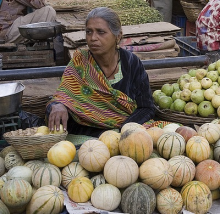
The European Patent Office will hold a public hearing on Monsanto’s patent on a melon derived from conventional breeding. On 20 January, public oral proceedings in opposition will take place at the European Patent Office (EPO) in Munich for European patent EP1962578, which covers virus-resistant melon plants. The melons have a natural resistance to the cucurbit yellow stunting disorder virus that turns melons yellow and reduces yields. Using conventional breeding methods, agrochemical giant Monsanto introduced a gene from another melon plant. This gene was already found in a melon plant in India that was catalogued in 1961 and has been publicly available since 1966. The patent application was filed in 2006 and the patent became effective in 2011. “Monsanto’s melon patent is biopiracy at its most devious. First of all, the patented resistance was not invented by Monsanto – just discovered in an Indian melon. Monsanto is now pretending to be the first to have bred it into other melons – but to copy something is not an invention”, says Francois Meienberg from The Berne Declaration. The patent covers the modified plant, parts of the plant and its fruits and seeds, but not the breeding process itself. Opposition to Monsanto’s melon patent also comes from India’s National Biodiversity Authority: “The actions of Monsanto in using Indian melon varieties in research and development with commercial intent including application of a patent based on Indian melon varieties amounts to a blatant violation of Section 3 and 6 of the Biological Diversity Act,” the authority wrote in a letter to Monsanto already in 2012. The melon patent is not the first patent granted by the EPO on plants and animals derived from conventional breeding. In October, Swiss agrochemical giant Syngenta was granted a patent on a seedless pepper derived from conventional breeding. In December, its Technical Board of Appeal confirmed a patent on the conventionally bred “wrinkled tomato” that has a reduced water content. Research by “No Patents on Seeds!”, a coalition of more than 200 organisations, shows that in 2015 around hundred new patent applications were filed. These patents concern carrots, potatoes, maize and other plants. Amongst the applicants are big companies such as Bayer, Dupont/Pioneer and Monsanto. In total, around 1400 patent applications on conventional breeding are pending with around 180 already granted by the EPO. This has been heavily criticised by non-governmental organisations. They warn that food production is becoming increasingly dependent on just a few big international companies. Nevertheless, EPO’s Enlarged Board of Appeal ruled in March 2015 in a decision on the precedent cases of broccoli and tomato, that plants obtained by essentially biological processes are patentable even though European Patent Law does not allow patents on the conventional breeding of plants and animals. (ab)
